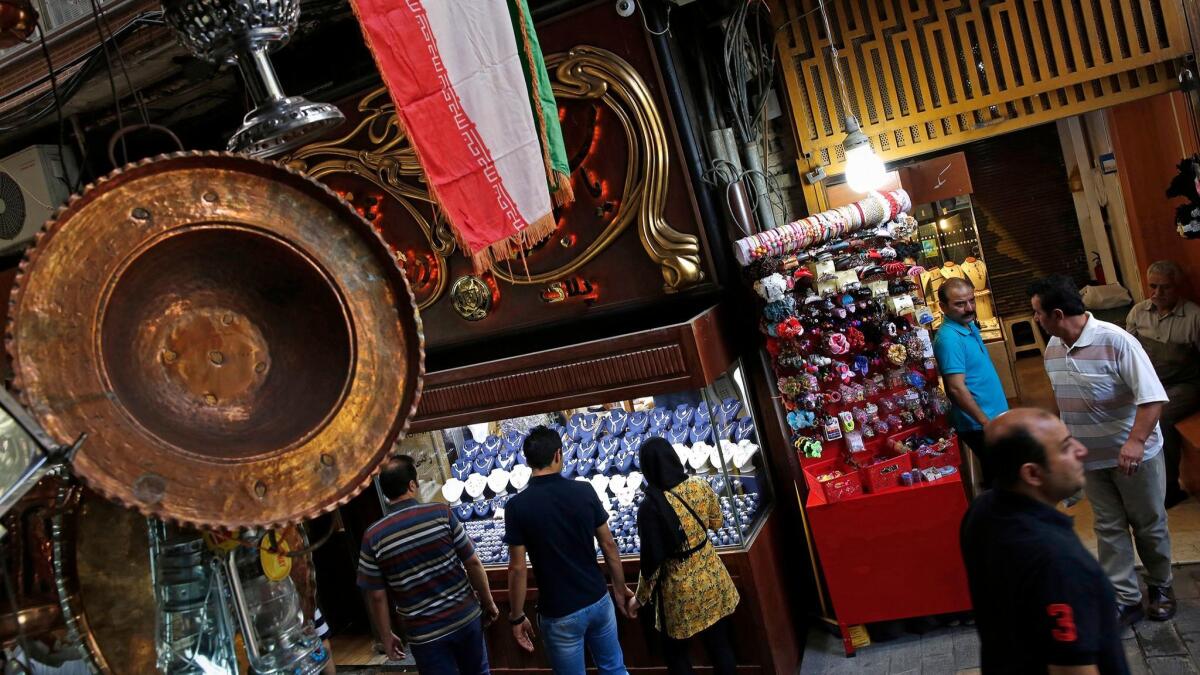Why empty suit shops and barber’s chairs could spell trouble for Iran’s President Hassan Rouhani

Reporting from TEHRAN — Usually in the weeks before Nowruz, the Iranian New Year, downtown Tehran is jammed with traffic as shoppers pick up gifts in the brightly lighted shops surrounding the British and German embassies.
But this year, the streets were noticeably quieter, the popular clothing and home appliance stores reporting much less business around the holiday in March.
“Compared to last year, our sales were down at least 10%,” said Mehdi Mosavi, 27, standing idle in his father’s menswear shop. “In fact, in the past five years our sales have been plunging.”
The ongoing financial crunch in Iran, always the No. 1 topic on many Tehran residents’ minds, has taken on added significance ahead of next month’s presidential election, a test of voters’ support for President Hassan Rouhani’s efforts to stabilize an economy battered by international sanctions and official mismanagement.
Moderates and reform-minded Iranians, who back Rouhani’s reelection, argue that macroeconomic trends have improved and that inflation has dropped from stratospheric levels since he took office in 2013.
“Bringing down 44% inflation to less than 8% in less than four years is an economic miracle,” Majid Ansari, the vice president for legal affairs, said recently.
But conservatives who oppose the president argue that ordinary Iranians have seen their purchasing power drop. They find plenty of evidence among city dwellers, who make up 70% of Iran’s 80 million-plus population and report a slack job market and significantly less spending on nonessential items.
Ali Rezavand, who owns a barbershop near Tehran University, said clients who used to come for haircuts every two weeks now wait six to seven weeks between visits.
“Haircuts are like sunglasses — it is an elastic good, not a staple,” said Rezavand, 40. “I can tell you that my income has been diminishing year in and year out.”
Mohammad Moradi, a 23-year-old working behind the counter at a small grocery, said he has lost nearly a third of his business.
“People simply cannot afford to buy anything but their staple foods,” said Moradi, cracking open sunflower seeds in his empty shop. “When it comes to ice cream or biscuits, or anything to eat for fun, they think twice.”
The Nowruz holiday served as a moment of stock-taking as the Persian calendar year drew to a close and campaigning for the May 19 election heated up.
Although most international sanctions against Iran were lifted more than a year ago, after Rouhani’s government agreed to curbs on its nuclear program, some unilateral U.S. restrictions remain and have hampered economic recovery.
Conservatives seeking to unseat Rouhani, a relative moderate who has tried to patch up relations with the West, have mounted a political offensive, saying the president misled Iranians into believing the nuclear deal would bring economic relief.
Even conservative former President Mahmoud Ahmadinejad has joined the anti-Rouhani chorus. Iran’s supreme leader, Ayatollah Ali Khamenei, has told him not to run again, so the rabble-rousing Ahmadinejad is instead backing the candidacy of his former vice president, Hamid Baghaei, who served seven months in jail on corruption charges.
A populist who retains a following among working-class Iranians, Ahmadinejad has called on Rouhani to restore cash payments to civilians that the president discontinued because they contributed to runaway inflation.
At a recent news conference in Tehran, his first in years, Ahmadinejad rattled off a list of economic problems he ascribed to the current administration.
“Our people are suffering from soaring prices, severe diminishing of purchasing power, unprecedented weakness in [factory] production, a widening gap between the haves and have-nots, widespread corruption and discrimination, unemployment and a reduction of social capital,” Ahmadinejad said, accusing the government of manipulating figures.
Sayyid Laylaz, an economist close to the reformist camp, said Ahmadinejad’s policies were so detrimental to Iran’s economy that remedial measures will take four or five years.
Under Rouhani, Iran has all but ended costly gasoline imports and increased sales of Persian carpets to the U.S. and other countries, Laylaz said.
“If people are patient, purchasing power will return to what it was more than 12 years ago, before President Ahmadinejad came into office,” he said.
Rouhani remains popular, especially in urban areas, and the fractious conservatives have yet to coalesce around a challenger. Although the hard-line Guardian Council has the final say on the slate of candidates, many analysts believe Khamenei will support Rouhani’s candidacy in order to preserve continuity amid growing tensions with the Trump administration.
But the economy will remain the key issue in the campaign.
Ali Amiri, a retired primary school principal who now sells imported cars, said his income has dropped by more than 50% as more Iranians opt to lease domestic vehicles. Luxury car sales have all but dried up, the 60-year-old said, and some of his remaining customers have tried to cheat him.
“I have survived two heart attacks because of my clients’ bounced checks,” he said, joking.
Special correspondent Mostaghim reported from Tehran and Times staff writer Bengali from Mumbai, India.
Follow @SBengali on Twitter for more news from South Asia
Here’s one country where hard-liners might not be poised for election success: Iran
From L.A. to Tehran, nose jobs are a rite of passage and a quiet rebellion for many Persian women
Telegram was the app where Iranians talked politics. Then the government caught on
More to Read
Sign up for Essential California
The most important California stories and recommendations in your inbox every morning.
You may occasionally receive promotional content from the Los Angeles Times.











